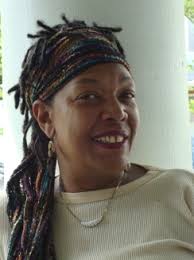 Margie Shaheed
Margie Shaheed
I met Margie Shaheed when I was teaching English literature at Rutgers-Newark in the early 1990s. Margie was returning to college as an adult student; in fact, we were close in age. She rocked my class with her inquisitive mind and passion for words. After she left Rutgers we stayed in touch and I watched her bloom as a community poet, deeply committed to writing about and sharing poetry with underserved communities. Her book Tongue Shakers, based on first-person interviews she conducted with immigrants, was born from several poems she published in the MER special issue on Mother Tongue. She published several beautiful poetry chapbooks, including The Playground, Dream Catcher, and Onomatopoeia. She would send me her work for feedback, and I’d shake my head in awe and tell her to keep going.
Two months ago she called to tell me she was very ill and say goodbye. I was devastated. I kept telling her she had more work to do; she had recently sent me a beautiful work-in-progress, a poetry manuscript about her childhood. But she knew more than I did about her illness, and my protestations were just that, my outrage that she was leaving too soon.
Margie’s was a passionate, lyrical voice that found beauty in dark places, protested against the injustices of racism and poverty, and called on all of us to remember our common humanity. She was my student, but she was also my teacher. She will be greatly missed.
— Nancy Gerber
Margie Shaheed
Code Breakers & Tongue Shakers
i. Tala Lualhati, Laguna, Philippines, June 20, 1976
I am a bright star. I embody spiritual peace. My name is seldom found among the
broken fragments and volcanic ash of Spanish and American vowels. Filipino names
like the dinosaur will soon disappear.
My language is called Tagalog sometimes confused with tag along. It means “river
dweller.” As a young student, I remember being given a stamp by my teacher to
carry with me at all times. It is in the odd shape of an indelible poem entitled, Sa
Aking Mga Kababata (To My Fellow Youth). It is plastered on the walls of my mouth
forever, and to this day, I believe /she who does not love her own mother tongue is
worse than a beast and rotten fish…/ Tagalog swims with me to America as a rare
riverine fish, toddling as a child who watches the back of her mother’s head as she
trails closely behind, her short legs trying to keep up with mother’s long strides.
I have pasted the stamp on the tongues of my two American born children so that
they can talk to my relatives back home. At times, my children’s ticklish tongues
cause the corners of the stamp to become unglued and when this happens they swap
Tagalog for English learned in school, or the Black English lodged on their father’s
tongue.
My husband, an African-American, reminds me of the indigenous Negritos, the little
black people, the hidden inhabitants of the Philippines only he is taller. He and the
Negritos share tainted history forcing them to speak in two tongues.
ii. Makeda Tadesse, Addis Ababa, Ethiopia, July 22, 1966
my american born children
a son 12 and a daughter 8
are embarrassed and refuse
to speak Amharic my mother
tongue in the presence of
american friends
i hate that my children
see her as a despised old
woman whose teeth are
yellowed by the undying
ritual of coffee ceremonies
can’t say i blame them much
americans are obsessed with
white teeth and are intolerant
of foreign accents and languages
after the wafting of aromatic smoke
after the obligatory blessings
after the bow with opened
palms turned up
after amen
before baraka*
i was told by an elder
at the last coffee ceremony
it has been observed
in our family that our
american born children
go through this phase
shunning anything not
red, white, or blue
until they are 15 years old
where the tug of war ceases
and the children begin to form
a communal identity
forged by cultural pride
i wish that day was now
Amharic is our main power source
if it dies
if we pull the plug
we become discon
nected from
family back
home
church
and ethiopian politics
in the meantime
i will continue to do
what i can to keep
my mother tongue alive
as a rule when my children
speak to me at home in english
i respond in Amharic and
require they respond back to me
in Amharic—if they don’t—
i am unresponsive to their wishes
it may seem harsh
but extreme circumstances
call for extreme measures
i must do whatever i can
to keep a warm place in my home
where my mother tongue thrives
*Baraka is the 3rd and final round of the traditional Ethiopian Coffee Ceremony. It means “bless you.”
Originally published in Mom Egg Review vol. 11 Mother Tongue issue.
Read another poem by Margie Shaheed here.
